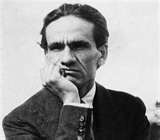I don’t know exactly why translating poetry is so fascinating. For me, it’s a way to work on a poem when I have no ideas of my own. The demands of translation–the fact that a literal translation just won’t do, and that you have to try to somehow capture the spirit of the poem without straying too far from the literal–is the challenge and the art. In some ways, I feel that all poetry is translation–sometimes I’m trying to translate my own glimmers of an idea, sometimes those of someone else.
 A decade ago, when Bob Hass had his weekly poetry column in a number of daily papers, he printed a translation of a poem by the Peruvian poet Cesar Vallejo. I’ve mentioned these columns before–they’ve been collected into two books, Poet’s Choice and Now and Then–great morning readings, both of them. You can find Bob’s original column on Vallejo in the Washington Post archives.
A decade ago, when Bob Hass had his weekly poetry column in a number of daily papers, he printed a translation of a poem by the Peruvian poet Cesar Vallejo. I’ve mentioned these columns before–they’ve been collected into two books, Poet’s Choice and Now and Then–great morning readings, both of them. You can find Bob’s original column on Vallejo in the Washington Post archives.
At the time I didn’t know about the column, and happened to read the one on Vallejo riding home on BART, chancing on it in an abandoned copy of the San Francisco Examiner. Bob printed the Stanley Burnshaw translation and one of his own. Ed Hirsch, when he did his own version of Poet’s Choice, printed Robert Bly’s translation. Here is the Spanish:
 Piedra Negra Sobre Una Piedra Blanca
Piedra Negra Sobre Una Piedra Blanca
Me moriré en París con aguacero,
un día del cual tengo ya el recuerdo.
Me moriré en París–y no me corro–
tal vez un jueves, como es hoy, de otoño.
Jueves será, porque hoy, jueves, que proso
estos versos, los húmeros me he puesto
a la mala y, jamás como hoy, me he vuelto,
con todo mi camino, a verme solo.
César Vallejo ha muerto, le pegaban
todos sin que él les haga nada;
le daban duro con un palo y duro
también con una soga; son testigos
los días jueves y los huesos húmeros,
la soledad, la lluvia, los caminos…
Cesar Vallejo
Here’s my version. I tried to get at some of the rhyme:
Black Stone on White Stone
I will die in Paris, in the pouring rain
0n a day I already remember
I will die in Paris, I can’t evade it,
perhaps on Thursday, perhaps September.
And it will be a Thursday, a Thursday like today.
as I write these lines, my arm bones ache
and never before in all the long lonely way
of my life have I felt so forsaken.
Caesar Vallejo is dead; everyone beat him up
though he does nothing to provoke them.
They beat him hard with a stick
and beat him hard with a rope.
The Thursdays bear witness, and my aching bones,
the loneliness, the roadways, and the rain.
This poem has been much translated. Its quiet, troubling desolation has captured the imagination of many poets. And what does the title mean? You can look up the various attempts to get it right, or try your own. I’d love to see it if you do. And yes, Vallejo died in Paris in 1938.